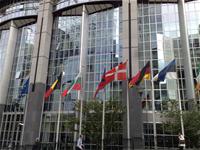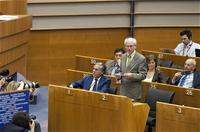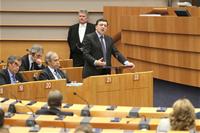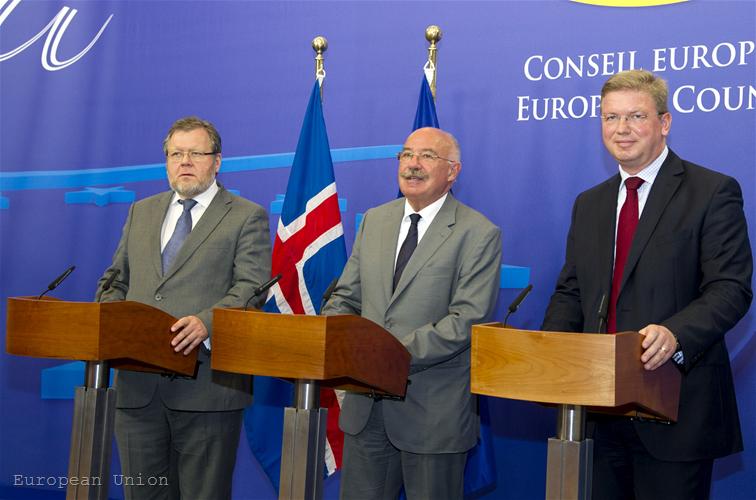EP condemnded the lack of control in European Council's conclusions
Adelina Marini, June 25, 2010
 Members of the European Parliament heavily criticised the conclusions of the June 17 European Council because of a lack of a clear control on non-compliance with budgetary discipline. This happened during a hearing in the European Parliament in Brussels of the president of the European Council Herman van Rompuy and the president of the European Commission Jose Manuel Barroso on Wednesday evening. Before the almost empty hall-room of the Parliament Mr Rompuy tried to defend the Council's conclusions by saying that the main aspects of the economic performance of the Union remain entirely within national competence.
Members of the European Parliament heavily criticised the conclusions of the June 17 European Council because of a lack of a clear control on non-compliance with budgetary discipline. This happened during a hearing in the European Parliament in Brussels of the president of the European Council Herman van Rompuy and the president of the European Commission Jose Manuel Barroso on Wednesday evening. Before the almost empty hall-room of the Parliament Mr Rompuy tried to defend the Council's conclusions by saying that the main aspects of the economic performance of the Union remain entirely within national competence.
With regard to the financial sector the priority should be solid and healthy banking system. This is why it is necessary the European Parliament and the Ecofin Council (the Council of EU's finance ministers) to rapidly adopt legislative proposals for financial supervision in order to ensure that the European Systemic Risk Board as well as the other three supervision authorities will start working in the beginning of next year.
No matter the expectations for more "Europeanisation" of the budgetary  discipline Mr van Rompuy underlined: "I should emphasize that it was never suggested that finance ministers should have to submit their national budget to the Commission for approval prior to the submitting it to their national parliaments. No one would have endorsed such an infringement of parliamentary competences". In the same time, he added, there were indications of emerging consensus that there was no need of new institutions for economic governance.
discipline Mr van Rompuy underlined: "I should emphasize that it was never suggested that finance ministers should have to submit their national budget to the Commission for approval prior to the submitting it to their national parliaments. No one would have endorsed such an infringement of parliamentary competences". In the same time, he added, there were indications of emerging consensus that there was no need of new institutions for economic governance.
It was the economic governance that was heavily criticised by Guy Verhofstadt, a leader of the Alliance of Liberals and Democrats for Europe (ALDE) and former Prime Minister of Belgium. He said that the most important issue was who would control and sanction those countries who do not comply with the rules. "Will the control be in the hands of Member States themselves, of the Council and will the Member States be sanctioning themselves? Or will it be an independent institution? A communitarian institution of the EU. That is the key question today?"
 The Co-president of the "Europe of Freedom and Democracy" group Nigel Farage directly attacked European politicians for the lack of vision about the future of the single European currency. He said that there was no Plan B to help countries like Greece, Spain and Portugal which in some point in the future would have to leave the euro. "Just how much do these countries have to suffer in the pursue of this euro dream? Just how much unemployment does there have to be? What level of civil disorder is acceptable to hold together a currency that simply cannot work. And I wonder for how much longer will the Germans go on paying the enormous bill?"
The Co-president of the "Europe of Freedom and Democracy" group Nigel Farage directly attacked European politicians for the lack of vision about the future of the single European currency. He said that there was no Plan B to help countries like Greece, Spain and Portugal which in some point in the future would have to leave the euro. "Just how much do these countries have to suffer in the pursue of this euro dream? Just how much unemployment does there have to be? What level of civil disorder is acceptable to hold together a currency that simply cannot work. And I wonder for how much longer will the Germans go on paying the enormous bill?"
The EPP MEP Corien Wortmann Kool said that the crisis required a more solid base for the single currency. The Co-president of the Greens/European Free Alliance group Rebecca Harms agreed that supervision was necessary but it was an absurd that there was no interference of a controlling institution envisaged in the Council's conclusions.
 | © European Union
| © European Union | © Larus Karl Ingason
| © Larus Karl Ingason | © euinside
| © euinside